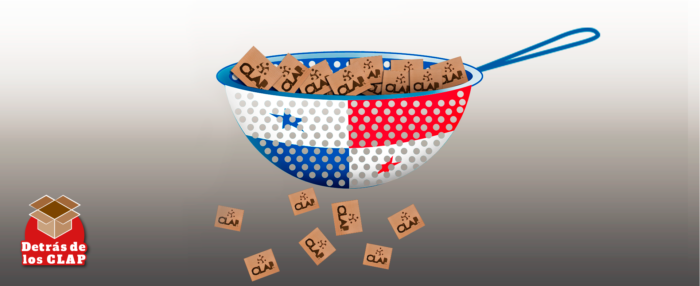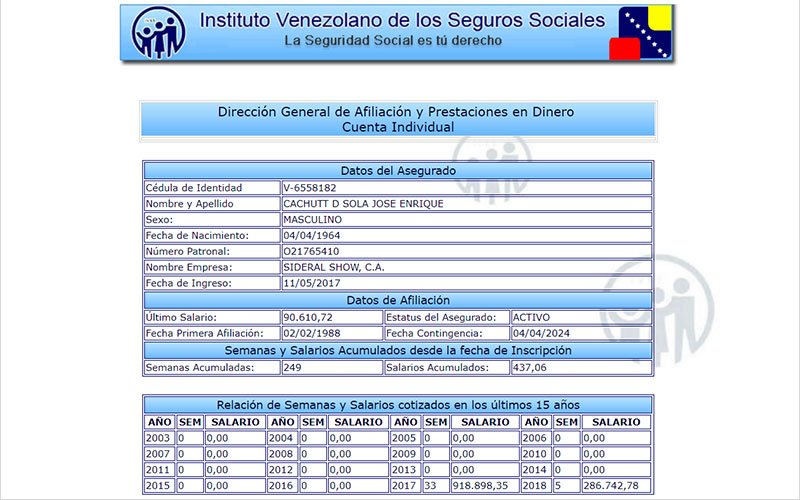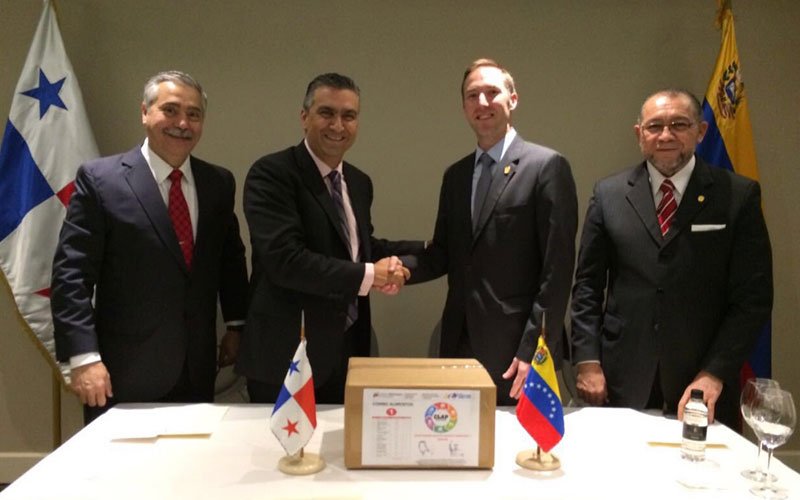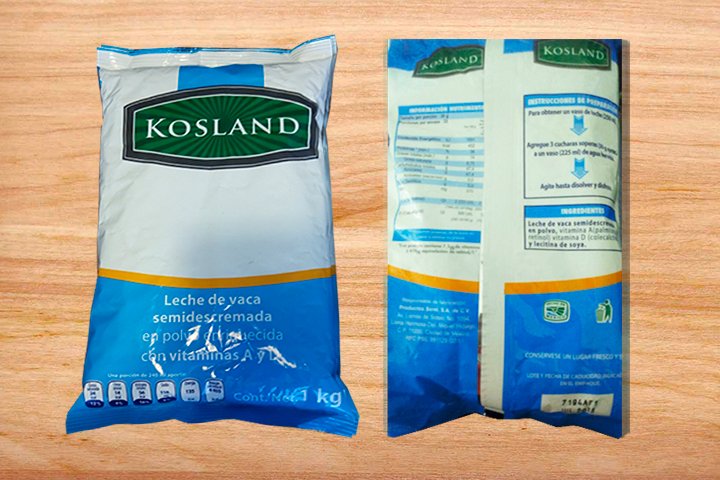
The tension between the governments of Nicolás Maduro and Juan Carlos Varela is nonstop. But the surge of trade retaliations from both capitals peculiarly leaves some of the companies that since 2017 provide merchandise to Chávez’s flagship program (the Local Supply and Production Committees - Clap) unharmed. Two of these companies show the profile of opportunistic shell companies.
|
Getting your Trinity Audio player ready...
|
The ban that the Venezuelan Government recently
imposed to almost a hundred Panamanian companies is showing its true colors. The
fuss and dialogue of Nicolás Maduro Government officials suggest a trade breakup
with Panama. But a thorough review of the Caracas blacklist reveals the
precision with which Venezuelan authorities avoid to incur "collateral damage,"
thus evading the incorporation of registered companies or companies operating in
the isthmus that act as intermediaries in the supply business of imported food
for the Local Supply and Production Committee (Clap) in Venezuela. Incidentally,
they do not appear among the companies sanctioned by the Panamanian Government
of Juan Carlos Varela either.
Some
example are FB Foods LLC and Wellsford Trading Corp, two shell companies
incorporated in the Panamanian capital that have been active in the shipment of
supplies for the Claps, a program implemented two years ago, aimed to ease the
ravages of the chronic shortage of essential goods among the low-income
population - the electoral customers of Chavism.
Caracas sanctions were focused - at least on the first list of 46 companies - on big names of the binational trade, like Compañía Panameña de Aviación (Copa)—one of the few airlines that still flight to Venezuela—, and Samsung, the Korean electronics company, and the Swiss Sanofi Aventis, both with headquarters in Panama. They are prevented from operating in Venezuela for 90 days, effective April 6, but the period could be extended. All in retaliation for the penalty previously imposed in Panama City to 55 officials and 16 companies from Venezuela related to Carlos Malpica Flores, nephew of the Venezuelan first lady, Cilia Flores.
While new punitive measures are being suggested in both countries, the surge already went up one step with Panama banning Venezuelan airlines from landing in that country, and the publication on Friday of a second list with 50 other Panamanian companies banned by the Venezuelan authorities. "The Bolivarian Government rejects the unacceptable aggression of the anti-grass roots and corrupt government of President Juan Carlos Varela against the people of Venezuela. The president @JC_Varela aims to divert attention from the serious moral breakdown that his government is going through," Venezuelan Vice President Tareck El Aissami attacked on Twitter on the afternoon of April 5.
Minutes later, the Central American Head of State responded on the social media with a poisoned dart by suggesting that Venezuela's ruling leaders are lining their pockets at the expense of the hunger of its citizens. "I do not know what is more difficult to understand, seeing a rich country which most of its population depends on the distribution of food bags to feed itself, or seeing a top authority of this country enrich himself with the sale of these bags," Varela said and spread the suspicions.
But, in the midst of the fierce crossfire, FB Foods and Wellsford emerged unscathed.
There are two companies registered in Panama, operating as contractors of the state-owned Corporación Venezolana de Comercio Exterior (Corporvex), which in 2017 invoiced millions of dollars in exchange for the food combos. FB Foods LLC, incorporated on March 24, 2017 by the law firm De La Fuente & Saldaña, Abogados (Delasa), which unlike the Morgan & Morgan law firm, was not on the list of companies banned by the Venezuelan Government.
By the date FB Foods LLC was founded, the idea of the Claps had taken off. With the CLAPs conceived in late 2016, the Government of Nicolás Maduro fed the people by means of massive food imports through intermediaries from Barbados (Postar Intertrade Limited) and Hong Kong (Group Grand Limited) from Mexico, the country which most of the so-called combos or Clap bags came from, and which was the great beneficiary of the Venezuelan state program. To be part of the millionaire business, the $ 10,000 capital with which FB Foods LLC was created sufficed.
Just months before the incorporation of FB Foods LLC, in July 2016, the then Vice President of the Economic Area, Miguel Pérez Abad, and the Major General of the Air Force and still President of Corpovex, Giuseppe Yoffreda Yorio, sealed an agreement in Panama with the Minister of Commerce of that nation, Augusto Arosemena, for just over 16,000 tons of food that would allow putting together up to three million Clap combos. The military man and Venezuelan ambassador to Panama, Jorge Durán Centeno, who due to the recent diplomatic tension, was called to Caracas for consultations, was present at the signing of the agreement. But in September 2016, Durán Centeno was celebrating the progress of the agreement. "The Venezuelan and Panamanian community accelerate the rhythm to fulfill the commitment with the Claps from the isthmus," he posted on Twitter along with some photos showing the now popular Clap boxes stacked.
One of these boxes dominated the table on which the
authorities of both nations signed the agreement. Panamanian local media
reported on that occasion that it was a 46 million-dollar business, which would
benefit at least five "Panamanian companies," the names of which were not
disclosed. "This was a transparent and direct agreement, without intermediaries,
between the Venezuelan Government and Panamanian producers and companies," Pérez
Abad said to La Prensa on July 31, 2016. The official said that the exchange
could scale up to 100 million dollars. "This is the first round of business, so
to speak, but we hope it will be the beginning of a fluid and reciprocal trade
between both countries."
In July 2017, one year after those words, FB Foods LLC received payments from the Venezuelan Government through the National Development Fund (Fonden) that went to a company account at the CIM Banque in Geneva, Switzerland. A list of Clap suppliers recently disclosed by Well Thought Consultants —a consulting firm created in U.S.A. and behind which is Hebert García Plaza, Minister of Food and the Water and Air Transportation portfolio in the early years of Maduro’s government— gave FB Foods LLC an agreement for 500,000 Clap boxes.
"This was a transparent and direct agreement, without intermediaries, between the Venezuelan Government and Panamanian producers and companies"
José Enrique Cachutt D'Sola appears as the legal representative and president of the company, while Daniel Alberto Regalado Plaza holds the position of treasurer, both Venezuelan. According to the Venezuelan Institute of Social Security (IVSS), Cachutt D'Sola works for Sideral Show C.A. in Venezuela, while press releases indicate that he was the director of Club Campestre Los Cortijos, east of Caracas. A warehouse on calle Bernardette in that area of ??the Venezuelan capital is the address that appears on the shipping documents made by FB Foods LLC.
As of the close of this article, Cachutt D'Sola did not respond to the interview request to clarify if his agreement was part of that negotiation initiated by Venezuelan officials in mid-2016. However, ImportGenius, international trade database, shows that between last year’s September and October, he made food shipments to Venezuela from the ports of Cartagena, Colombia, and Manzanillo, Panama. Sources familiar with the Clap business claim that FB Foods LLC would be connected to other traders used by the Government since late 2016. To date, Armando.info has revealed the presence of Group Grand Limited, Postar Intertrade Limited, Million Rise Industries Limited , J & B International Trading, and MIR Importació I Exportació.

Another shell company, registered as Wellsford Trading
Corp, stands out among the winning bidders of a portion of the substantial
business. Like FB Foods LLC, neither Wellsford Trading Corp nor the firm that
served as settlement agent (Sucre, Arias & Reyes) were subject to the ban
imposed by the Venezuelan Government.
On July 8, 2017, a year after Miguel Pérez Abad and Giuseppe Yoffreda Yorio negotiated with the Panamanian Minister of Commerce, Wellsford Trading Corp billed to the productive and food service company Corporación Única de Servicios Productivos y Alimentarios (Cuspal), attached to the Ministry of Food, 73,710 Clap boxes from the port of Veracruz, Mexico. Each one was valued at $ 34.87 —a total of $ 2.57 million, a small part of a larger agreement for two million combos that the company negotiated with Corpovex, the state holding company led by Yoffreda Yorio that works as a public imports control agency. That agreement would entail sales of nearly 70 million dollars to this unknown company, registered in Panama, on November 25, 2013.

The president of the company is Plutarco Cohen Camarano, a Panamanian who acts as a "front man" for this type of holding companies, thus allowing concealment of the true beneficiaries of the company. His name appears in hundreds of companies of the isthmus, as well as others registered in tax havens, to the point that it came out years ago with the Offshore leaks, coordinated by the International Consortium of Investigative Journalists (ICIJ).
At that time, according to a report published by La Nación, Plutarco Cohen was related to a company created in the British Virgin Islands associated to an Argentine senator linked to Kirchnerism, Juan Hector Estrada. In that paper, Plutarco Cohen also appears as president of Grupo Avelina Internacional, a Panamanian affiliate of the Venezuelan company of the same name, belonging to Mauro Libi, a businessman recently questioned by the comptroller's commission of the Venezuelan National Assembly. "Grupo Libi, owner of the Avelina brand in Venezuela, hired in Panama the services of the Sucre, Arias, Reyes legal firm in order to register the brand internationally. We were informed that the most suitable mechanism to carry it out was incorporating a company with no par value shares, the underwriters and managers of which had to be of Panamanian. However, given our status as foreigners, it was a legal and lawful practice in Panama that the Panamanian legal firm assumed the selection of those people and that there would be no problem with the control of the company since the share titles would remain in our possession and the firm would assume the responsibility before the authorities as the resident agent of the company, a role that it maintains in the present, " said the communication team of Avelina when asked about the figure of Plutarco Cohen.
The records of ImportGenius show that Wellsford Trading Corp bought from the Mexican Productos Serel SA de CV the food that it later billed to the Venezuelan Government. Like many of the intermediaries involved in the business, the shipments left from the port of Veracruz and berthed in La Guaira with the kits already put together with eleven food products, like pasta, canned tuna, tomato sauce or milk powder, among others.

As a matter of fact, the milk sent by Productos Serel under the Kosland brand was one with the worst nutritional values of the eight Mexican brands analyzed by the Institute of Food Science and Technology of Universidad Central de Venezuela, at the request of Armando.info, and on which no authority has made a statement. Productos Serel is just one of the Mexican suppliers used by Venezuelan Government traders together with others like El Sardinero, La Cosmopolitana, Solo Un Precio Servicios Inmobiliarios, Grupo Brandon or Deshidratados Alimenticios e Industriales (DAI).
For some months now, parliament members of different opposition political parties have been offering to make informal proceedings on request before agencies like the Colombian Attorney General's Office and the United States Department of the Treasury. They issue letters of good conduct to those responsible for negotiations on the imports for CLAP combos, so that such agencies absolve or stop investigating entrepreneurs like Carlos Lizcano, a subordinate of the already sanctioned Alex Saab and Alvaro Pulido. The fact that the most active defense of the main social program and focus of corruption of the government of Nicolas Maduro comes from the heart of the National Assembly 'in contempt' is just one of the ironies of this story.
Adrián Perdomo Mata has just entered the list of sanctioned entities of the US Department of the Treasury, as president of Minerven, the state company in charge of exploring, exporting and processing precious metals, particularly gold from the Guayana mines. His arrival in office coincided with the boom in exports of Venezuelan gold to new destinations, like Turkey, to finance food imports. Behind these secretive operations is the shadow of Alex Saab and Álvaro Pulido, the main beneficiaries of the sales of food for the Local Supply and Production Committee (Clap). Perdomo worked with them before Nicolás Maduro placed him in charge of the Venezuelan gold.
A study by Mexican authorities confirms what the palate of the Venezuelans quickly detected: There is something odd in the Mexican canned tuna that comes in the combos of the Local Supply and Production Committee (CLAP). At least three of the brands that the poorest homes have consumed in the country since March 2016, when the state plan was formalized, have high proportions of soy, a vegetable protein that although not harmful, it does not have the same taste and protein contribution of tuna. Behind the addition of soy there is an operation to reduce costs where all the intermediaries, handpicked by the Venezuelan Government to buy the goods, have participated.
Gassan Salama, a Palestinian-cause activist, born in Colombia and naturalized Panamanian, frequently posts messages supporting the Cuban and Bolivarian revolutions on his social media accounts. But that leaning is not the main sign to doubt his impartiality as an observer of the elections in Venezuela, a role he played in the contested elections whereby Nicolás Maduro ratified himself as president. In fact, Salama, an entrepreneur and politician who has carried out controversial searches for submarine wrecks in Caribbean waters, found his true treasure in the main social aid and control program of Chavismo, the Clap, for which he receives millions of euros.
While the key role of Colombian entrepreneurs Alex Saab Morán and Álvaro Pulido Vargas in the import scheme of Nicolás Maduro’s Government program has come to light, almost nothing has been said about the participation of the traders who act as suppliers from Mexico. These are economic groups that, even before doing business with Venezuela, were not alien to public controversy.
Even though there are new brands, a new physical-chemical analysis requested by Armando.Info to UCV researchers shows that the milk powder currently distributed through the Venezuelan Government's food aid program, still has poor nutritional performance that jeopardizes the health of those who consume it. In the meantime, a mysterious supplier manages to monopolize the increasing imports and sales from Mexico to Venezuela.
When Vice President Delcy Rodríguez turned to a group of Mexican friends and partners to lessen the new electricity emergency in Venezuela, she laid the foundation stone of a shortcut through which Chavismo and its commercial allies have dodged the sanctions imposed by Washington on PDVSA’s exports of crude oil. Since then, with Alex Saab, Joaquín Leal and Alessandro Bazzoni as key figures, the circuit has spread to some thirty countries to trade other Venezuelan commodities. This is part of the revelations of this joint investigative series between the newspaper El País and Armando.info, developed from a leak of thousands of documents.
Leaked documents on Libre Abordo and the rest of the shady network that Joaquín Leal managed from Mexico, with tentacles reaching 30 countries, ―aimed to trade PDVSA crude oil and other raw materials that the Caracas regime needed to place in international markets in spite of the sanctions― show that the businessman claimed to have the approval of the Mexican government and supplies from Segalmex, an official entity. Beyond this smoking gun, there is evidence that Leal had privileged access to the vice foreign minister for Latin America and the Caribbean, Maximiliano Reyes.
The business structure that Alex Saab had registered in Turkey—revealed in 2018 in an article by Armando.info—was merely a false start for his plans to export Venezuelan coal. Almost simultaneously, the Colombian merchant made contact with his Mexican counterpart, Joaquín Leal, to plot a network that would not only market crude oil from Venezuelan state oil company PDVSA, as part of a maneuver to bypass the sanctions imposed by Washington, but would also take charge of a scheme to export coal from the mines of Zulia, in western Venezuela. The dirty play allowed that thousands of tons, valued in millions of dollars, ended up in ports in Mexico and Central America.
As part of their business network based in Mexico, with one foot in Dubai, the two traders devised a way to replace the operation of the large international credit card franchises if they were to abandon the Venezuelan market because of Washington’s sanctions. The developed electronic payment system, “Paquete Alcance,” aimed to get hundreds of millions of dollars in remittances sent by expatriates and use them to finance purchases at CLAP stores.
Scions of different lineages of tycoons in Venezuela, Francisco D’Agostino and Eduardo Cisneros are non-blood relatives. They were also partners for a short time in Elemento Oil & Gas Ltd, a Malta-based company, over which the young Cisneros eventually took full ownership. Elemento was a protagonist in the secret network of Venezuelan crude oil marketing that Joaquín Leal activated from Mexico. However, when it came to imposing sanctions, Washington penalized D’Agostino only… Why?
Through a company registered in Mexico – Consorcio Panamericano de Exportación – with no known trajectory or experience, Joaquín Leal made a daring proposal to the Venezuelan Guyana Corporation to “reactivate” the aluminum industry, paralyzed after March 2019 blackout. The business proposed to pay the power supply of state-owned companies in exchange for payment-in-kind with the metal.